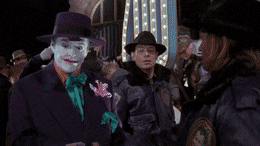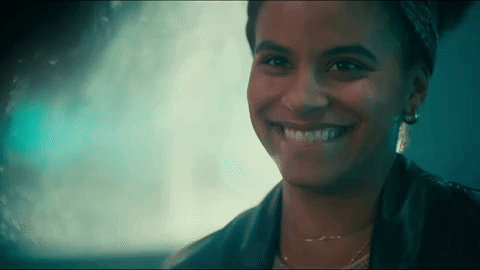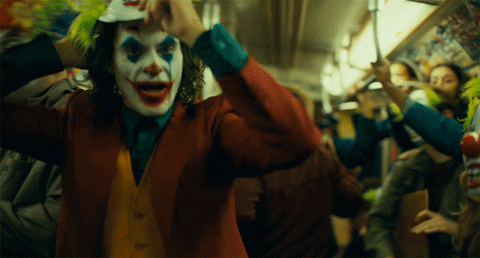Audiences thought Todd Phillips’ new film Joker would finally give the character a backstory. But it doesn’t. Instead, it urges fans to use their imaginations. Joaquin Phoenix’s take on the character is a psychologically disturbing one. His Joker is a failed stand-up comic named Arthur Fleck who suffers from a disorder that causes him to combust into uncontrollable laughter at the most inappropriate times. He’s also delusional—seeing, hearing and remembering things that are oftentimes not real (or so we think). This has resulted in a clown-car full of interpretations and theories surrounding the Joker’s story. What’s a more appropriate origin story for a mysterious character than an uncertain one? Here are the most batshit, enjoyable, and exhausting theories out there. Warning: major spoilers ahead!
Cover Photo: Warner Bros.
A couple of clowns: Heath Ledger’s Joker vs. Joaquin Phoenix’s Joker
Smile and frown: Directors Who Pulled a Todd Phillips and Successfully Transitioned From Comedy to Drama (And Vice Versa)
Follow Mandatory on Facebook, Twitter, and Instagram.
Our Favorite and Most Exhausting Joker Theories
-
Arthur Fleck is in fact the illegitimate son of Thomas Wayne.

One of the major subplots of Joker dances manically with the idea that Arthur Fleck and Bruce Wayne may be related. Arthur’s mother, Penny Fleck, used to be a Wayne Enterprises employee and may have had an affair with Thomas Wayne. When Arthur confronts big daddy Wayne later in the film, Thomas writes Penny off as mentally ill (which she is). Thomas’ accusations appear to be confirmed when Arthur reads medical records stating that his mother spent time in a mental institution (Arkham), he was abused as a child, and that he is actually adopted.
There are many details that indicate Thomas Wayne is lying, not the least of which is the fact that he’s a powerful dick. Wayne is a well-connected man in Gotham; his upper-class relationships (an ex-MI6 butler for example) and history in the medical profession would make it very easy for him to cover up his affair (and subsequent bastard-baby Joker). It’s not like they had paternity tests in the '70s. In addition to this, after Arthur kills Penny, he finds a photograph with a message on the back that reads: "Love your smile. – TW."
-
Arthur Fleck isn’t the Joker (but may have inspired the real one).

Vulnerable Arthur Fleck isn’t exactly the clown prince of crime. Most of what Fleck gets away with in Joker can be chalked up to luck. He has no intention of becoming the poster child of a “kill the rich” rebellion, he’s just a disturbed human being. Given Joker’s setting (and Arthur’s age), it is more likely that the events of Joker inspire the real Joker: the demented mastermind and archnemesis of Batman.
A popular idea people have been embracing concerns Tim Burton’s Batman. In that film, Bruce Wayne’s parents are killed in an alleyway by Jack Napier, who eventually becomes the Joker. At the end of Joker, the Waynes are killed again (white pearls and all) in an alleyway as a result of riots breaking out across the city.
-
The Flashpoint Paradox

Joaquin Phoenix’s Arthur Fleck is too old to eventually be the archenemy of an adult Bruce Wayne in Joker. A fan on Reddit suggested that all of this makes sense because of time travel. The only superhero in the DCEU to time travel is the Flash.
In the comics, the Flash ran through time to save his mother. As we all know, if you mess with time, time messes back. When the Flash did this he ended up altering reality and changing all sorts of superhero narratives. This would not only account for a bunch of inconsistencies in Joker but every inconsistency in the DCEU.
-
The whole story is the delusion of a mentally disturbed man.

The heart and soul of the interpretation debate revolve around the film’s ending. After the “events” of the film, we find Arthur Fleck in Arkham asylum, not with green hair (which he should have because he dyed it), but with brown-grey hair, indicating a time lapse. He’s being evaluated by a psychiatrist who seems eerily similar to the social worker he talks to earlier in the film. All of this presents the possibility that the entire (or at least parts) of the story is a vivid fantasy—a result of Arthur’s fractured mind. The film’s director has even said that the movie is less about being presented with facts and more about being presented with possibilities.
-
Arthur is in Arkham the entire time.

A lot of people have noticed the fact that the clock in Arkham at the end reads 11:11—the time one usually makes a wish. If the entire story we see is taking place in Arthur’s head (as he creates a dream backstory for himself), then this would be fitting. Unfortunately, Todd Phillips confirmed the whole 11:11 thing as merely a coincidence.
The dream backstory theory still fits; throughout the film, there are various moments where Arthur fantasizes. Early in the film he imagines he’s on the Franklin Murray show, the crowd laughing at his stand-up routine, and an entire relationship with his neighbor Sophie. All of these things make Arthur an extremely unreliable narrator. So he could either A) be recounting his story years later or B) running through his ideal fantasy over and over. If he truly is the Joker, it would make sense for him to see himself as a sympathetic character and to blame Batman’s family for all of his problems.
-
Arthur kills Sophie.

One of the most devastating realizations in Joker comes when Arthur goes to visit Sophie and she is weirded out by his presence. She only sees him as the strange dancer from down the hall when he thinks they have an entire romantic history. It comes as a shock to the audience and to Arthur that this is not true. Reeling from discombobulation, Arthur points a finger gun to his head, goes back to his own apartment and laughs on the couch in pain. Sirens are then heard outside his window. It wouldn’t be a stretch to assume Arthur went bonkers on Sophie.
-
Batman already exists in 'Joker.'

At the end of the movie, when Arthur is being interviewed, he starts laughing. When asked why, he says that “you wouldn't get it.” The film cuts to a young Bruce Wayne and the dead bodies of Thomas and Martha. Rumor has it that the original script had the line “you wouldn’t get it, it’s a joke between me and him.” There’s no denying the ways in which Joker relates to Batman’s origin story. Arthur Fleck is essentially responsible for starting a revolution, the death of Batman’s parents, and loss of Bruce’s innocence.
If Arthur has been sitting in a mental institution the entire movie and is rewriting his past, why would he work the Cape Crusader’s origin story into the mix? Is it because Batman is the reason he’s in Arkham in the first place? The darkest and most suitable comedy the Joker could create for himself is one where his life is intertwined with Batman's in a "chicken or the egg" sort of way. The character of the Joker is one very fond of his own insanity. The more explicit line was most likely cut to exhaust our patience for ambiguity.
-
'Joker' isn’t a comic book movie at all.

There are a lot of things that separate the character of Arthur Fleck from that of the Joker. Aside from the clown makeup and a proclivity for laughter, Arthur lacks the confidence, articulation, and vision of the usual supervillain we are presented. However, once Arthur stops taking his meds, and the closer he becomes to embraces the Joker persona, the more the movie teases connections to its apparent source material.
Joker begins with a man that “thinks he felt better when he was locked up in the hospital.” It shows us a plethora of unsettling circumstances and interactions, darkness marinating in the depths of a divided society (and a torn man). The film drops enough fan service and comic book call-outs (Wayne, Dr. Ben Stoner, etc.) to make us comfortable with our pending assumption that “Oh, it’s a comic book movie.” Just when we think we know what we’re watching, Joker rips the rug out from under us.
In interviews, the filmmakers have said they used the guise of a comic book movie to make something else, and that’s what Joker is. Hopefully, they never make a sequel; we will forever be left wondering what happened. The film serves as a catalyst for the viewer’s imagination, while leaving its monster in the closet, and challenging our understanding of comic book movies. When Arthur Fleck’s blood-stained footprints victoriously fill the final frame, it indicates that Todd Phillips and Joaquin Phoenix have fooled us all.





